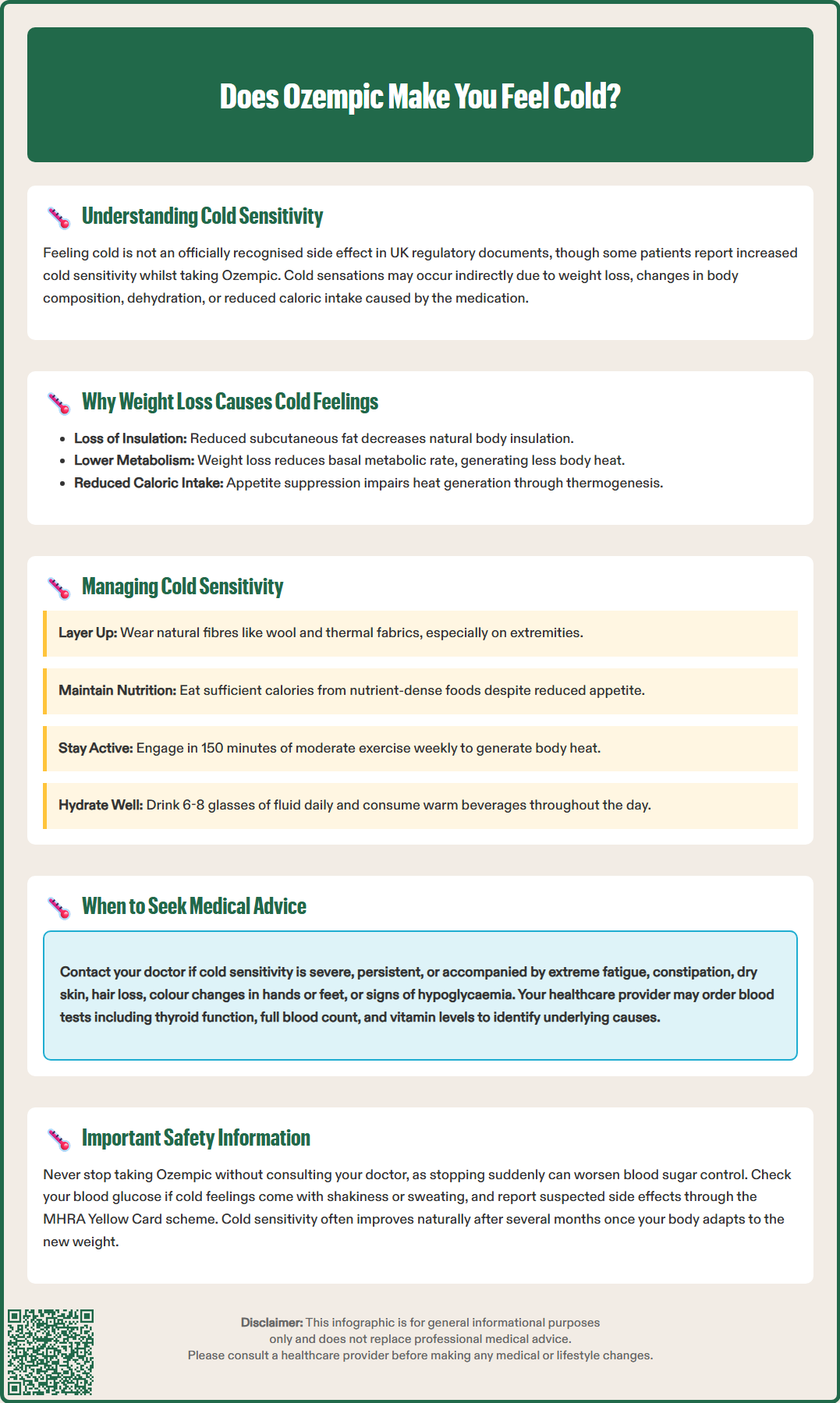
Ozempic (semaglutide) is a glucagon-like peptide-1 (GLP-1) receptor agonist licensed in the UK for type 2 diabetes mellitus and, at higher doses as Wegovy, for weight management. Whilst feeling cold is not listed as a recognised adverse effect in the MHRA-approved Summary of Product Characteristics, some patients report increased cold sensitivity whilst taking this medication. This is most commonly attributed to weight loss and reduced body fat insulation rather than a direct pharmacological effect. Understanding the potential causes and when to seek medical advice can help patients manage this symptom effectively whilst continuing treatment.
Quick Answer: Feeling cold is not a recognised adverse effect of Ozempic, but some patients report increased cold sensitivity, most commonly due to weight loss reducing body fat insulation rather than a direct drug effect.

Mounjaro® is the most innovative GLP-1 medication proven to dramatically curb appetite, hunger, and cravings to help professional men achieve substantial weight loss.
Start Here
Wegovy® is a weekly injectable GLP-1 medication with proven effectiveness in reducing appetite, hunger, and cravings to help busy professionals lose significant weight.
Start HereOzempic (semaglutide) is a glucagon-like peptide-1 (GLP-1) receptor agonist licensed in the UK for the treatment of type 2 diabetes mellitus and, at higher doses (marketed as Wegovy), for weight management in adults with obesity or overweight with weight-related comorbidities. Feeling cold is not listed as a recognised adverse effect in the Summary of Product Characteristics (SmPC) approved by the Medicines and Healthcare products Regulatory Agency (MHRA), though some patients report increased cold sensitivity whilst taking this medication.
The mechanism by which Ozempic works involves mimicking the action of endogenous GLP-1, which enhances glucose-dependent insulin secretion, suppresses glucagon release, slows gastric emptying, and reduces appetite through central nervous system pathways. These effects contribute to improved glycaemic control and, frequently, substantial weight loss. There is currently no established evidence in UK regulatory documents that semaglutide alters thermoregulation, and reports of cold sensitivity are largely anecdotal.
However, patients may experience sensations of feeling cold for reasons indirectly related to the medication's effects, particularly its impact on body weight and composition. Other potential contributors include dehydration and reduced caloric intake. It is also important to check blood glucose levels if feeling cold is accompanied by shakiness or sweating, as these may indicate hypoglycaemia, particularly if you are also taking insulin or sulfonylureas.
If you are experiencing persistent or concerning cold sensitivity whilst taking Ozempic, it is advisable to discuss this with your GP or diabetes specialist nurse to rule out other underlying causes. Any suspected adverse reactions can be reported through the MHRA Yellow Card scheme.

The most plausible explanation for increased cold sensitivity in patients taking Ozempic relates to rapid or substantial weight loss, which is a common and intended effect of the medication. Clinical trials have demonstrated that semaglutide 2.4 mg (Wegovy) can lead to significant reductions in body weight—typically 10–15% of baseline weight over 12–18 months in patients using it for weight management. Weight loss with Ozempic doses used for type 2 diabetes is typically more modest.
When the body loses weight, particularly adipose (fat) tissue, it loses a layer of natural insulation that helps maintain core body temperature. Subcutaneous fat acts as thermal insulation, and its reduction can make individuals more susceptible to feeling cold, especially in cooler environments. This phenomenon is well-documented in people who lose weight through any means, whether dietary modification, increased physical activity, bariatric surgery, or pharmacotherapy.
Additionally, weight loss is often accompanied by a reduction in basal metabolic rate (BMR)—the amount of energy the body expends at rest. A lower BMR means less heat is generated as a by-product of cellular metabolism, which can contribute to feeling colder. This metabolic adaptation is a normal physiological response to weight loss and is not unique to Ozempic.
Furthermore, some patients may experience reduced caloric intake whilst taking Ozempic due to its appetite-suppressing effects. Inadequate energy intake and dehydration can impair the body's ability to generate heat through thermogenesis. It is therefore important to maintain adequate nutrition and hydration even whilst experiencing reduced appetite, ensuring a balanced diet in line with the NHS Eatwell Guide. If you have kidney disease or other health conditions, personalised dietary advice from a dietitian may be beneficial.
Whilst feeling cold as a consequence of weight loss is generally benign, there are circumstances in which cold sensitivity warrants medical evaluation. You should contact your GP or diabetes care team if:
Cold sensitivity is severe, persistent, or progressively worsening
You experience cold intolerance accompanied by other symptoms such as extreme fatigue, constipation, dry skin, hair loss, or unexplained weight gain
You develop symptoms suggestive of hypothyroidism (underactive thyroid), which can cause cold sensitivity (note that while GLP-1 receptor agonists have been associated with C-cell tumours in rodent studies, there is no established link to hypothyroidism in humans)
You notice signs of anaemia, such as pallor, breathlessness, or palpitations, which can cause cold sensitivity
Cold hands or feet are accompanied by colour changes (white, blue, or red), pain, or numbness, which may indicate circulatory problems
You experience unexplained fever, chills, or rigors, which could suggest infection
You have symptoms of hypoglycaemia (low blood sugar) such as shakiness, sweating, or confusion, especially if you also take insulin or sulfonylureas
NICE guidance (NG28) recommends regular monitoring of patients on GLP-1 receptor agonists, including assessment of glycaemic control, weight, and tolerability. Your healthcare provider may wish to perform blood tests to exclude other causes of cold intolerance, such as:
Thyroid function tests (TSH, free T4) to rule out hypothyroidism
Full blood count to check for anaemia
Ferritin and iron studies, particularly if anaemia is suspected
Vitamin B12 and folate levels, particularly if you have a history of metformin use (MHRA has issued a Drug Safety Update on metformin and B12 deficiency)
HbA1c to assess diabetes control
It is important not to discontinue Ozempic without medical advice, as abrupt cessation may lead to deterioration in glycaemic control. Your healthcare team can help determine whether the cold sensitivity is related to the medication, weight loss, or another underlying condition requiring specific treatment.
If you are experiencing increased cold sensitivity whilst taking Ozempic, there are several practical strategies that may help improve comfort without compromising the therapeutic benefits of the medication:
Dress appropriately: Layer clothing to trap warm air close to the body. Natural fibres such as wool and thermal fabrics can provide effective insulation. Pay particular attention to extremities—wear warm socks, gloves, and hats when outdoors, as significant heat loss occurs through the head and hands.
Maintain adequate nutrition: Ensure you are consuming sufficient calories to support your basal metabolic needs, even if your appetite is reduced. Focus on nutrient-dense foods that provide a balanced diet in line with the NHS Eatwell Guide. Adequate protein intake is important to preserve lean muscle mass during weight loss, but specific requirements should be discussed with your healthcare team, especially if you have kidney disease or other health conditions.
Stay hydrated: Dehydration can contribute to feeling cold. Aim to drink 6-8 glasses of fluid daily as recommended by the NHS.
Monitor your blood glucose: If you are taking Ozempic alongside insulin or sulfonylureas, check your blood glucose levels regularly, especially if you experience cold sensations with shakiness or sweating. Discuss with your healthcare team if you need dose adjustments of these medications.
Stay physically active: Regular physical activity generates body heat and helps maintain muscle mass, which supports metabolic rate. The UK Chief Medical Officers' guidelines recommend that adults aim for at least 150 minutes of moderate-intensity aerobic activity per week, along with muscle-strengthening activities on two or more days per week.
Optimise your environment: Keep your home at a comfortable temperature (typically 18–21°C as advised by NHS winter health guidance). Use blankets, hot water bottles, or heating pads when resting. If you have diabetic neuropathy or impaired sensation, take care with heat sources to avoid burns. Warm beverages throughout the day can provide temporary comfort and contribute to hydration.
Monitor your weight loss rate: Whilst Ozempic is effective for weight reduction, excessively rapid weight loss may increase cold sensitivity and other adverse effects. Discuss your weight loss trajectory with your healthcare team—a rate of 0.5–1 kg per week is generally considered safe and sustainable according to NHS guidance.
Consider the timing: Cold sensitivity often improves as the body adapts to its new weight and metabolic state. Many patients find that symptoms diminish after several months of weight stability. Patience and consistent self-care strategies are important during this adjustment period.
Cold sensitivity on Ozempic is most commonly caused by weight loss, which reduces subcutaneous fat insulation and lowers basal metabolic rate. This is a normal physiological response to weight reduction rather than a direct drug effect.
No, feeling cold is not listed as a recognised adverse effect in the MHRA-approved Summary of Product Characteristics for Ozempic. Reports of cold sensitivity are largely anecdotal and typically related to weight loss.
Contact your GP if cold sensitivity is severe or persistent, or if accompanied by extreme fatigue, hair loss, unexplained weight gain, breathlessness, or colour changes in hands and feet, as these may indicate thyroid dysfunction, anaemia, or circulatory problems requiring investigation.
All medical content on this blog is created based on reputable, evidence-based sources and reviewed regularly for accuracy and relevance. While we strive to keep content up to date with the latest research and clinical guidelines, it is intended for general informational purposes only.
DisclaimerThis content is not a substitute for professional medical advice, diagnosis, or treatment. Always consult a qualified healthcare professional with any medical questions or concerns. Use of the information is at your own risk, and we are not responsible for any consequences resulting from its use.